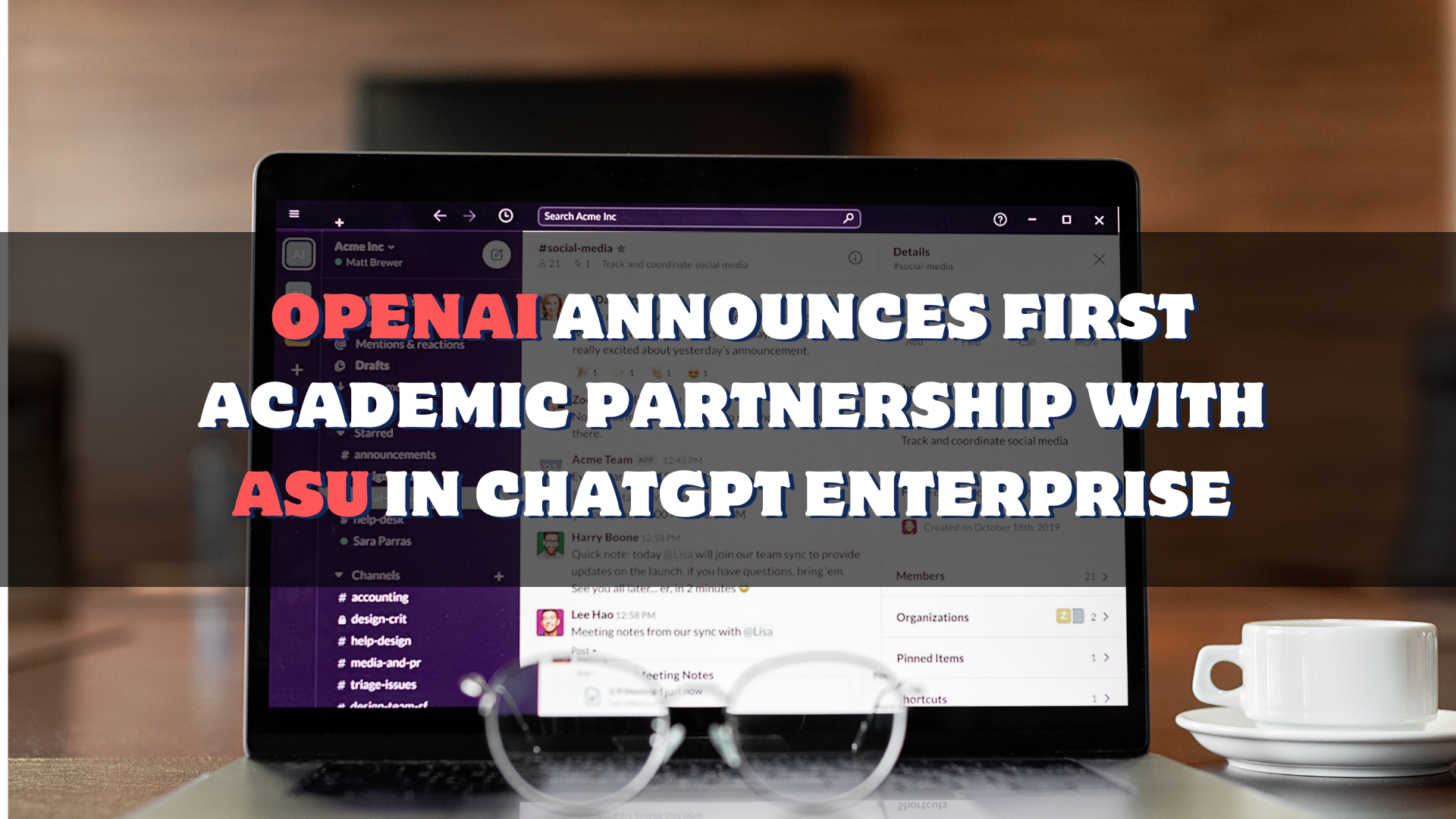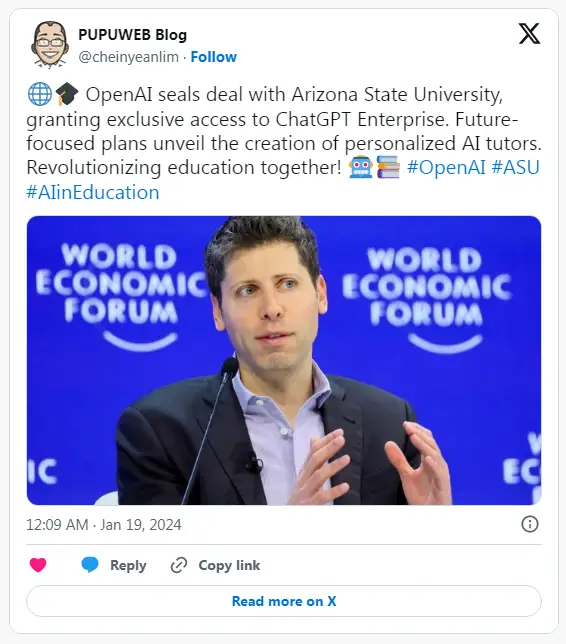OpenAI Announces First Academic Partnership With ASU In ChatGPT Enterprise

In an era where technology and education intersect more profoundly than ever, a groundbreaking collaboration emerges, setting a new precedent in the realm of higher education. Arizona State University (ASU), a vanguard in educational innovation, and OpenAI, a trailblazer in artificial intelligence, have joined forces. This partnership marks a significant milestone, not just for these two entities, but for the future trajectory of AI’s role in academia. In this article, we delve into the intricacies of this collaboration, exploring its genesis, objectives, and the potential seismic shifts it promises in the landscape of higher education. As we navigate through this narrative, we invite you, the reader, to envision a future where AI is not just a tool, but a transformative force in the educational journey.
Explore how ASU’s pioneering partnership with OpenAI and the integration of ChatGPT Enterprise is reshaping higher education, enhancing learning, and driving academic success.
Table of Contents
What Happened Between Arizona State University And OpenAI?
The Genesis of the Partnership
The partnership between ASU and OpenAI was born out of a shared vision to integrate cutting-edge AI technology into the fabric of higher education. This collaboration is the first of its kind, where an academic institution and an AI research entity have come together to explore the uncharted territories of AI’s potential in academia.
Objectives and Goals
Central to this partnership is the goal to harness AI, particularly through the use of OpenAI’s ChatGPT Enterprise, to revolutionize teaching methodologies, enhance research capabilities, and provide a more personalized and effective learning experience for students.
Implementation Strategy
ASU plans to implement ChatGPT Enterprise across various facets of its educational and administrative framework. This includes integrating AI into classroom teaching, utilizing it as a tool for research and development, and improving administrative efficiency through AI-driven solutions.
How Can AI Help Faculty And Students In Higher Education?
The integration of AI into higher education heralds a new era of learning and teaching. For faculty, AI tools like ChatGPT Enterprise can serve as invaluable assistants, aiding in research analysis, automating administrative tasks, and providing insights into student learning patterns. This not only enhances the efficiency of educators but also allows them to focus more on the qualitative aspects of teaching.
For students, AI opens up a world of personalized learning. AI systems can adapt to individual learning styles, pace, and preferences, offering customized support and feedback. This personalized approach can help in identifying knowledge gaps and providing targeted learning interventions, thereby enhancing the overall educational experience.
Moreover, AI in higher education paves the way for innovative research methodologies. Students and faculty can leverage AI’s data processing and analysis capabilities to delve deeper into complex research questions, fostering a culture of innovation and discovery.
In essence, the integration of AI in higher education by ASU, in collaboration with OpenAI, is not just about technological advancement; it’s about redefining the educational landscape to be more inclusive, efficient, and forward-thinking.
ASU's Strategic Approach to AI in Education
Arizona State University’s approach to integrating AI into its educational framework is both strategic and visionary. Recognizing the transformative potential of AI, ASU has embarked on a journey to weave this technology into the very fabric of its educational system. This strategy is multi-faceted, focusing on enhancing the learning experience, empowering educators, and fostering a culture of innovation and research.
Central to ASU’s strategy is the creation of an AI-enhanced curriculum. This involves not only the incorporation of AI tools into classroom teaching but also the development of new courses that focus on AI and its applications. By doing so, ASU aims to equip students with the knowledge and skills necessary to thrive in an increasingly AI-driven world.
Another key aspect of ASU’s approach is the use of AI for personalized learning. Leveraging AI’s capability to analyze vast amounts of data, ASU plans to offer tailored learning experiences to students, adapting to their individual learning styles, pace, and preferences. This personalized approach is expected to improve student engagement, retention, and success rates.
Furthermore, ASU is committed to using AI to enhance its research capabilities. By employing advanced AI tools in research projects, ASU aims to accelerate discovery and innovation, enabling its researchers to tackle more complex and meaningful problems.
In summary, ASU’s strategic approach to AI in education is a comprehensive plan that aims to revolutionize the educational experience for students and faculty alike, setting a new standard for AI integration in higher education.

The Future of Academic Success Driven By AI
The future of academic success in higher education is increasingly being shaped by AI. This technology promises to revolutionize the way education is delivered and consumed, making it more personalized, efficient, and impactful. AI-driven education can adapt to individual learning needs, provide real-time feedback, and offer insights that were previously unattainable.
One of the most significant impacts of AI in education is its ability to personalize learning at scale. AI systems can analyze individual student performance, learning styles, and preferences, and then tailor the educational content accordingly. This means that each student can receive a learning experience that is best suited to their needs, leading to better understanding and retention of knowledge.
AI also has the potential to transform the role of educators. With routine tasks and basic content delivery being handled by AI, educators can focus more on higher-level teaching activities such as mentoring, problem-solving, and critical thinking guidance. This shift can lead to a more fulfilling educational experience for both teachers and students.
Moreover, AI opens up new avenues for research and collaboration. It enables the analysis of complex data sets, fosters interdisciplinary studies, and facilitates global collaboration, thereby expanding the frontiers of academic research.
In essence, the future of academic success driven by AI is one where education is more adaptive, personalized, and effective, preparing students for the challenges and opportunities of the future.
What Is ChatGPT Enterprise?
ChatGPT Enterprise is a state-of-the-art AI platform developed by OpenAI, designed to cater to the specific needs of organizations, including educational institutions like ASU. It represents a significant advancement over the standard ChatGPT model, offering enhanced capabilities in terms of scalability, security, and customization.
One of the key features of ChatGPT Enterprise is its ability to handle a higher volume of interactions with greater speed and efficiency. This makes it ideal for use in environments where there are large numbers of users, such as a university setting.
In terms of security, ChatGPT Enterprise offers robust data protection measures. It ensures that all interactions are secure and private, addressing one of the primary concerns of educational institutions regarding the use of AI.
Additionally, ChatGPT Enterprise allows for greater customization. Institutions can tailor the AI’s responses to fit their specific context and needs. This means that ASU can customize ChatGPT Enterprise to better align with its educational goals and objectives.
Overall, ChatGPT Enterprise is a powerful tool that can significantly enhance the educational experience, offering a level of interaction, personalization, and security that is well-suited for the demands of modern higher education.
ChatGPT Enterprise Safety Overview
Advanced Data Encryption and Security Protocols
ChatGPT Enterprise prioritizes data security through advanced encryption protocols. Every interaction and data exchange within the platform is encrypted, ensuring that sensitive information remains confidential and secure. This encryption extends to both in-transit and at-rest data, safeguarding against unauthorized access and potential breaches. OpenAI’s commitment to robust security measures in ChatGPT Enterprise reflects an understanding of the critical importance of data privacy in educational and organizational settings.
Compliance with Global Data Protection Regulations
OpenAI has designed ChatGPT Enterprise to be compliant with global data protection regulations, including GDPR and CCPA. This compliance ensures that the platform adheres to the highest standards of data privacy and user rights. Users can trust that their data is not only secure but also handled in accordance with strict regulatory guidelines, providing peace of mind and reliability in its application.
Regular Security Audits and Updates
To maintain the highest level of security, ChatGPT Enterprise undergoes regular security audits and updates. These audits are conducted by independent security experts who assess the platform for vulnerabilities and potential threats. Following these audits, OpenAI implements updates and patches to fortify the platform’s defenses, ensuring that ChatGPT Enterprise remains at the forefront of security technology, safeguarding user data against evolving digital threats.
Conclusion
The partnership between Arizona State University and OpenAI, marked by the integration of ChatGPT Enterprise, is more than just a technological advancement; it’s a visionary step towards redefining educational paradigms. This collaboration paves the way for a future where AI not only enhances learning experiences but also drives academic success through personalized and efficient educational processes. As we embrace this new era, the potential of AI in education unfolds, promising a landscape where technology and human ingenuity collaborate to unlock unprecedented possibilities in learning and research.
FAQ
The primary goal is to integrate AI, specifically ChatGPT Enterprise, into ASU’s educational framework to enhance teaching, learning, and research.
ChatGPT Enterprise employs advanced data encryption, complies with global data protection regulations, and undergoes regular security audits to ensure user data privacy and security.
Yes, ChatGPT Enterprise offers customization options to align with specific educational goals and objectives, making it a versatile tool for academic institutions.

